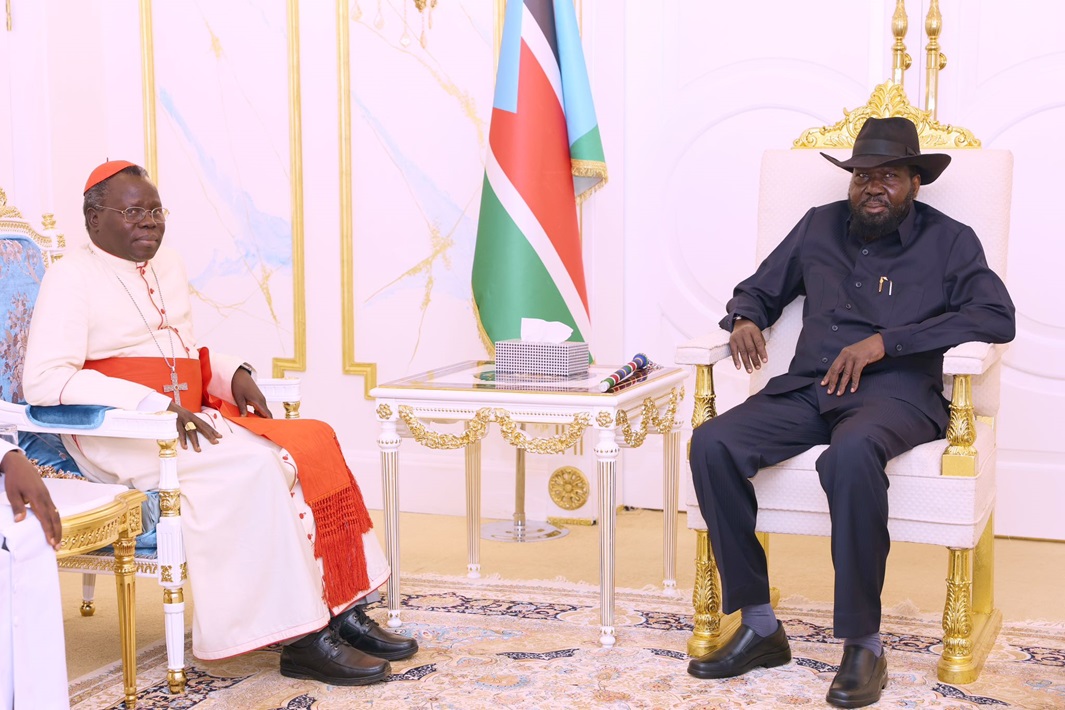By Paschal Norbert
JUBA, APRIL 1, 2025 (CISA) – Catholic Bishops in South Sudan have issued a powerful appeal for peace in the midst of rising violence and political instability. In a statement by Cardinal Stephen Ameyu Mulla, President of the Sudan and South Sudan Catholic Bishops’ Conference (SSSCBC), the bishops echoed the nation’s profound fears of descending into violent conflict and ethnic strife.
“We, the Bishops of the Sudan and South Sudan Catholic Bishops’ Conference (SSSCBC), speak with one united voice, grieved and alarmed by the escalating violence and deteriorating political climate in South Sudan. The clashes between the SSPDF and SPLA-IO, the arrest of political leaders including First Vice President Dr. Riek Machar Teny, and the increasing displacement of innocent civilians-especially women and children-mark a tragic reversal of the peace we have all longed and prayed for,” noted the bishops in the statement by Cardinal Ameyu.
In the March 28 statement, the Cardinal urged an immediate return to dialogue and restraint, highlighting the nation’s turmoil following the arrest of opposition leader Dr. Riek Machar Teny and the looming threat of renewed civil unrest.
“The people of South Sudan have suffered too long. War has taken their children, their homes, their future-and yet again, the dark clouds of conflict hover over our nation,” lamented the Archbishop of Juba, while stating “From the beginning of this renewed crisis, we the Church have stood firm in calling for restraint, dialogue, and commitment to the Revitalized Agreement on the Resolution of Conflict in South Sudan (R-ARCSS).”
“We once again call on President Salva Kiir Mayardit, all political leaders, and parties to the agreement, including the R-TGoNU, to honour their sacred obligation to the people of South Sudan and resist any temptation to revert to arms,” the bishops appealed.
In the statement, the Catholic bishops also emphasized the grave risks posed by increased military involvement, notably highlighting the deployment of the Uganda People’s Defense Force (UPDF) to the streets of Juba as a particularly dangerous escalation.
They warned, “The arrest of opposition leaders and the involvement of foreign military forces, especially the deployment of the Uganda People’s Defense Force (UPDF), has only served to heighten fear and mistrust. Such actions risk turning our beloved country into a battleground for external interests and political manipulation.”
The prelates were unequivocal in issuing a stark warning: if the violence were to intensify, the consequences would be catastrophic, imperiling the future of the nation and devastating generations to come.
“We caution our leaders: if South Sudan returns to full-scale violence, the consequences will be catastrophic. The loss of human life, the collapse of national unity, and the breakdown of already fragile institutions will devastate future generations. The political neglect of the suffering of our people—of the poor, the displaced, the orphans and the widows—will not go unremembered before God,” the bishops asserted.
As the nation reels from the recent arrest of Dr Riek Machar, a move that has further deepened divisions and inflamed tensions, the cardinal reiterated the Church’s readiness to mediate and foster dialogue: “As Shepherds of the Church, we remain ready to mediate dialogue, to be a voice for the voiceless, and to walk hand in hand with all who seek genuine peace. We urge civil society, youth and women’s groups, traditional leaders, the international community, and all people of good will to stand together against war and for peace.”
Background and Diplomatic Developments
South Sudan has long struggled with internal divisions and recurrent conflict since its hard-fought independence in 2011. The current crisis has been further inflamed by the arrest of First Vice President Riek Machar Teny—a key opposition figure whose detention has sparked outrage and fear of a return to widespread civil strife. Against this backdrop, the regional diplomatic scene is abuzz with urgent mediation efforts.
Kenya, under the leadership of President Ruto, who currently chairs the East African Community (EAC) Summit, has stepped forward to spearhead a diplomatic initiative aimed at reconciling the bitter divide between President Salva Kiir Mayardit and Dr Riek Machar. These talks, driven by a collective desire among regional powers to stabilize the Horn of Africa, underscore a critical effort to restore dialogue and avert further bloodshed.
